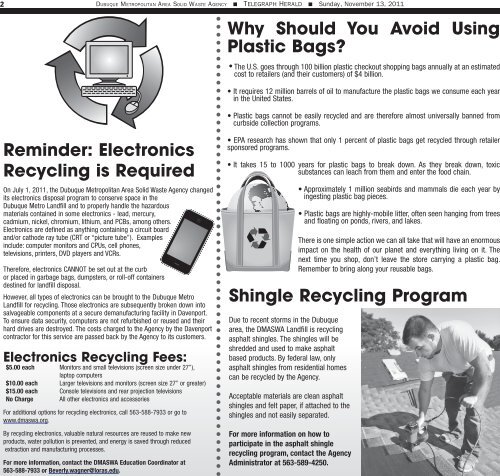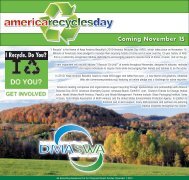I Recycle. Do You? - Dubuque Metropolitan Area Solid Waste Agency
I Recycle. Do You? - Dubuque Metropolitan Area Solid Waste Agency
I Recycle. Do You? - Dubuque Metropolitan Area Solid Waste Agency
You also want an ePaper? Increase the reach of your titles
YUMPU automatically turns print PDFs into web optimized ePapers that Google loves.
2<br />
Du b u q u e Me t r o p o l i t a n ar e a So l i D Wa S t e ag e n c y n TELEGRAPH HERALD n Sunday, November 13, 2011<br />
Reminder: Electronics<br />
Recycling is Required<br />
On July 1, 2011, the <strong>Dubuque</strong> <strong>Metropolitan</strong> <strong>Area</strong> <strong>Solid</strong> <strong>Waste</strong> <strong>Agency</strong> changed<br />
its electronics disposal program to conserve space in the<br />
<strong>Dubuque</strong> Metro Landfill and to properly handle the hazardous<br />
materials contained in some electronics - lead, mercury,<br />
cadmium, nickel, chromium, lithium, and PCBs, among others.<br />
Electronics are defined as anything containing a circuit board<br />
and/or cathode ray tube (CRT or “picture tube”). Examples<br />
include: computer monitors and CPUs, cell phones,<br />
televisions, printers, DVD players and VCRs.<br />
Therefore, electronics CANNOT be set out at the curb<br />
or placed in garbage bags, dumpsters, or roll-off containers<br />
destined for landfill disposal.<br />
However, all types of electronics can be brought to the <strong>Dubuque</strong> Metro<br />
Landfill for recycling. Those electronics are subsequently broken down into<br />
salvageable components at a secure demanufacturing facility in Davenport.<br />
To ensure data security, computers are not refurbished or reused and their<br />
hard drives are destroyed. The costs charged to the <strong>Agency</strong> by the Davenport<br />
contractor for this service are passed back by the <strong>Agency</strong> to its customers.<br />
Electronics Recycling Fees:<br />
$5.00 each Monitors and small televisions (screen size under 27”),<br />
laptop computers<br />
$10.00 each Larger televisions and monitors (screen size 27” or greater)<br />
$15.00 each Console televisions and rear projection televisions<br />
No Charge All other electronics and accessories<br />
For additional options for recycling electronics, call 563-588-7933 or go to<br />
www.dmaswa.org.<br />
By recycling electronics, valuable natural resources are reused to make new<br />
products, water pollution is prevented, and energy is saved through reduced<br />
extraction and manufacturing processes.<br />
For more information, contact the DMASWA Education Coordinator at<br />
563-588-7933 or Beverly.wagner@loras.edu.<br />
Why Should <strong>You</strong> Avoid Using<br />
Plastic Bags?<br />
•The U.S. goes through 100 billion plastic checkout shopping bags annually at an estimated<br />
cost to retailers (and their customers) of $4 billion.<br />
• It requires 12 million barrels of oil to manufacture the plastic bags we consume each year<br />
in the United States.<br />
• Plastic bags cannot be easily recycled and are therefore almost universally banned from<br />
curbside collection programs.<br />
• EPA research has shown that only 1 percent of plastic bags get recycled through retailer<br />
sponsored programs.<br />
• It takes 15 to 1000 years for plastic bags to break down. As they break down, toxic<br />
substances can leach from them and enter the food chain.<br />
• Approximately 1 million seabirds and mammals die each year by<br />
ingesting plastic bag pieces.<br />
• Plastic bags are highly-mobile litter, often seen hanging from trees<br />
and floating on ponds, rivers, and lakes.<br />
There is one simple action we can all take that will have an enormous<br />
impact on the health of our planet and everything living on it. The<br />
next time you shop, don’t leave the store carrying a plastic bag.<br />
Remember to bring along your reusable bags.<br />
Shingle Recycling Program<br />
Due to recent storms in the <strong>Dubuque</strong><br />
area, the DMASWA Landfill is recycling<br />
asphalt shingles. The shingles will be<br />
shredded and used to make asphalt<br />
based products. By federal law, only<br />
asphalt shingles from residential homes<br />
can be recycled by the <strong>Agency</strong>.<br />
Acceptable materials are clean asphalt<br />
shingles and felt paper, if attached to the<br />
shingles and not easily separated.<br />
For more information on how to<br />
participate in the asphalt shingle<br />
recycling program, contact the <strong>Agency</strong><br />
Administrator at 563-589-4250.



